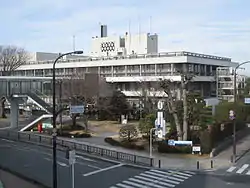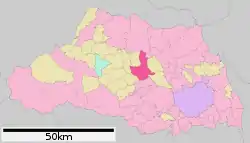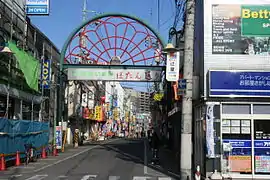Higashimatsuyama, Saitama
Higashimatsuyama (東松山市, Higashimatsuyama-shi) is a city located in Saitama Prefecture, Japan. As of 1 January 2021, the city had an estimated population of 90,456 in 41,124 households and a population density of 1400 persons per km².[1] The total area of the city is 65.33 km2 (25.22 sq mi).[2]
Higashimatsuyama
東松山市 | |
|---|---|
 Higashimatsuyama City Hall | |
 Flag  Seal | |
 Location of Higashimatsuyama in Saitama Prefecture | |
 Higashimatsuyama | |
| Coordinates: 36°2′31.8″N 139°23′59.7″E | |
| Country | Japan |
| Region | Kantō |
| Prefecture | Saitama |
| Area | |
| • Total | 65.35 km2 (25.23 sq mi) |
| Population (January 2021) | |
| • Total | 90,456 |
| • Density | 1,400/km2 (3,600/sq mi) |
| Time zone | UTC+9 (Japan Standard Time) |
| - Tree | Pinus |
| - Flower | Paeonia suffruticosa |
| Phone number | 0493-23-2221 |
| Address | 1-1-58 Matsuba-cho, Higashimatsuyama-shi, Saitama-ken 355-8601 |
| Website | Official website |

Geography
Higashimatsuyama is located in the geographic center of Saitama Prefecture.
Surrounding municipalities
Climate
Higashimatsuyama has a Humid subtropical climate (Köppen Cfa) characterized by warm summers and cool winters with light to no snowfall. The average annual temperature in Higashimatsuyama is 14.5 °C. The average annual rainfall is 1351 mm with September as the wettest month. The temperatures are highest on average in August, at around 26.6 °C, and lowest in January, at around 3.6 °C.[3]
Demographics
Per Japanese census data,[4] the population of Higashimatsuyama peaked in early 1990s.
| Year | Pop. | ±% |
|---|---|---|
| 1920 | 22,512 | — |
| 1930 | 24,904 | +10.6% |
| 1940 | 26,218 | +5.3% |
| 1950 | 36,099 | +37.7% |
| 1960 | 38,267 | +6.0% |
| 1970 | 50,383 | +31.7% |
| 1980 | 63,889 | +26.8% |
| 1990 | 84,394 | +32.1% |
| 2000 | 92,929 | +10.1% |
| 2010 | 90,103 | −3.0% |
History
Higashimatsuyama developed as a castle town from the Kamakura period, and was ruled as an outlier of Kawagoe Domain (later Maebashi Domain) during the Edo period Tokugawa shogunate. The town of Matsuyama was established within Hiki District, Saitama with the establishment of the modern municipalities system on April 1, 1889. Matsuyama merged with the villages of Ooka, Karako, Takasaka and Nomoto on July1, 1954, and was elevated to city status as Higashimatsuyama. [5]
Government
Higashimatsuyama has a mayor-council form of government with a directly elected mayor and a unicameral city council of 21 members. Higashimatsuyama, together with the towns of Kawashima and Yoshimi, contributes two members to the Saitama Prefectural Assembly. In terms of national politics, the city is part of Saitama 11th district of the lower house of the Diet of Japan.
Economy
Traditionally the economy of Higashimatsuyama was dominated by sericulture and silk weaving. Modern Higashimatsuyama has several industrial parks with a wide variety of light and medium manufacturing. Due to its geographic location, the city also serves as a bedroom community.
Education
Universities
- Daito Bunka University – Higashimatsuyama campus
Primary and secondary education
- Higashimatsuyama has 11 public elementary schools and five public middle schools operated by the city government, and two public high schools operated by the Saitama Prefectural Board of Education. In addition, there is one private middle school and one private high school. The prefecture also operates one special education school for the handicapped.
Transportation
Highway
.png.webp) Kan-etsu Expressway – Higashimatsuyama IC, Takasaka SA
Kan-etsu Expressway – Higashimatsuyama IC, Takasaka SA National Route 254
National Route 254 National Route 407
National Route 407
Local attractions
- Maruki Gallery for the Hiroshima Panels
- Peony Walk Higashimatsuyama
- Shobo-ji temple
Noted people from Higshimatsuyama
- Takaaki Kajita (born 1959), Physicist and Nobel Laureate[7]
References
- "Higashimatsuyama city official statistics" (PDF) (in Japanese). Japan.
- Higashimatsuyama city official home page statistical data
- Higashimatsuyama climate data
- Higashimatsuyama population statistics
- Higashimatsuyama city official home page: Outline of the city
- Information of Higashimatsuyama City Archived 2012-09-12 at the Wayback Machine Retrieved 7 November 2012.
- "Takaaki Kajita - Facts". Nobel Foundation. 6 October 2015. Retrieved 7 October 2015.
External links
![]() Media related to Higashimatsuyama, Saitama at Wikimedia Commons
Media related to Higashimatsuyama, Saitama at Wikimedia Commons
- Official Website (in Japanese)